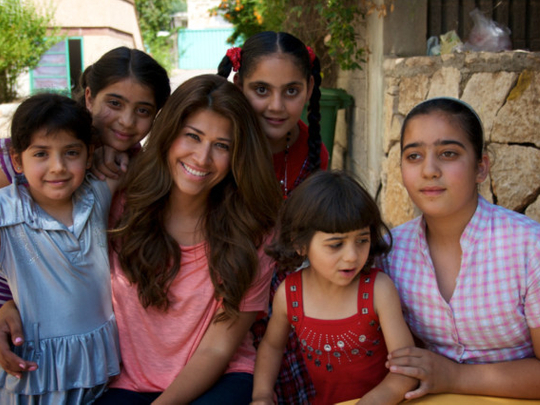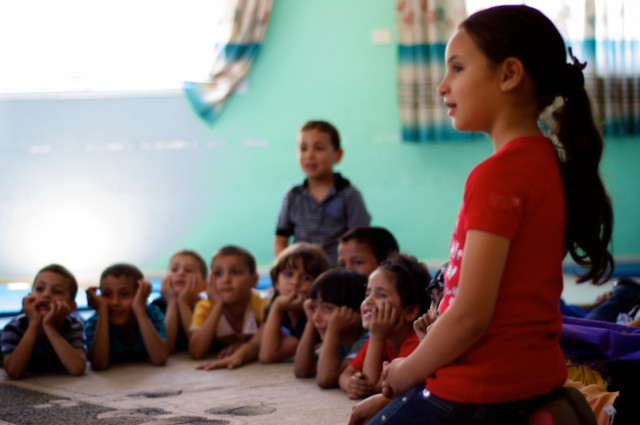
Six years ago, Hani Masri, a visionary Palestinian businessman, amid all the gloom that had enveloped the central West Bank city of Nablus, envisaged “the morning after” the end of the Israeli occupation and set the ball rolling with the establishment of Tomorrow’s Youth Organization (TYO).
TYO is unique, in that it is an American-registered non-governmental organisation (NGO) but based in Nablus. Two years ago, after the success of this initiative, TYO established a branch in Beirut, which serves the northern and southern parts of that country.
Added into this mix is Humaira Wakili, born in Afghanistan, raised in the United States, and today the country director of TYO. How did she land up in Palestine? “My academic background is in history. After graduating from San Diego State University, in California, I moved to Washington to work on development-related programmes. I got to learn much about the policy side by being there and it was only by a chance meeting with the former director of TYO, Nell Debevoise, who was looking for someone to take her place, that I ended up coming to Nablus.”
But it was not just the meeting, as she goes on to add, “I have always had an affinity for Palestine, and I believe that it is not portrayed to the American public as it really should be, and this drew me here.”
What fuels Wakili’s passion and her boundless enthusiasm for her work is that “TYO is non-political, non-religious. It is about human rights above all.”
For Wakili and her small American entourage, who are regularly supplemented with many volunteers coming from the “melting pot” that is the US, namely Arabs and Pakistanis, as well as others from the UK, New Zealand and Canada, adjustment to life here has been relatively easy.
“There is so much trust and respect from the community, for the work we are doing. Yes! We do adhere to the conservative norms of Nablus. On the other hand, we are the first American organisation to be based there, with personnel living in the city and serving the people in the nearby refugee camps as well, and for that we have attained a good measure of support from Palestinians in general.”
TYO has a small, full-time staff of three Americans and a handful of Palestinians. However, they rely on volunteers, both local and foreign. The local component is made up of between 50 to 100, and Wakili notes, “We are here, we want to offer services, we want Palestinians to get involved with a sense of ownership. People hang out at the centre and for many it has become a home and most importantly they feel content that they are doing something positive for their community.”
International volunteers pay for a three-month internship on their own and they are picked depending on the skill needs of TYO. Wakili is quick to point out, though, that “it is not ‘voluntourism’, although we take our volunteers on two educational tours, and on weekends they are free to travel and explore Palestine. The objective is for them to not only make a positive contribution, but to also understand the Palestinian issue in general and Nablus in particular.
“TYO works with about 350 universities in the US, from where we recruit our volunteers. We seek skills in social work, psychology, early childhood teaching and teaching English. Our international interns work with Palestinian students from An-Najah University who act as translators and benefit in doing so, by enhancing their own English-language competencies. So the relationship is mutually beneficial.”
Wakili adds, “They also teach at An-Najah University — soft skills courses related to CV writing, interviews and communication.”
However the core work or activities of TYO is divided into age-related programmes.
The Early Childhood Programme caters for 4- to 6-year-olds, with about 225 children enrolled per three yearly sessions. This programme offers an alternative for the less fortunate from the refugee camps and the neighbourhoods of the old city of Nablus, for these children’s parents do not have the financial means to enrol them in private kindergartens.
“The classes are mixed and these children learn English,” Wakili says. “It is a curriculum-based psychosocial holistic [teaching] with an emphasis on identity and communication”.
The next stage is the Youth Development Programme, which caters for 9- to 15-year-olds, and takes place after regular school hours. Wakili explains: “It is led by international interns with three sessions over the course of the year, teaching through play, IT, sports, drama and English, which act as vehicles to get children to understand themselves and to have a positive relationship with learning. In essence, it gives the youth an opportunity to open up to creativity. Most importantly, it is supplementary to their formal education.”
Then TYO has a Youth Service Learning Programme, targeting the 18- to 25-year-olds, which, Wakili says, “is in-service training, with students staying with the programme for three months. We don’t do one-off training, ours is a long-term intervention. Young Palestinians learn about leadership with personality development and acquisition of skills. Recently, with support from the Abdul Hameed Shoman Foundation, we’ve begun scaling up our support so our youth are better prepared for the workplace.”
Overall, TYO’s developmental approach takes a multigenerational, family-based approach. Wakili elucidates: “We have shown the benefits of our programmes to the mothers, whose children went back home dealing much better with the traumas most Palestinians face, and the mums then approached us. We began with fitness classes, computers, nutrition and English and the whole thing developed.
“Today we tackle cancer awareness, issues related to children with disabilities, depression and hygiene. On this, we work with 30 local NGOs and An-Najah University. We bring the women, they bring the expertise”.
Wakili reluctantly admits that expanding the women’s programme was her brainchild, which replaced the competitive nature of NGO activities with cooperation among local partners to jointly serve the needs of the women. “By empowering women, everyone around her benefits and this is how change is effected,” she says. “Men are not always the greatest obstacles; women may be complacent too.”
Another TYO initiative that Wakili is excited about is Fostering Women’s Entrepreneurship in the Middle East, supported by the Cheri Blair Foundation, with a focus on business development, coaching, mentoring and incubation, supplemented by legal services, social media and marketing assistance. TYO works with local partners who provide the technical training. “Since we are based in Nablus we provide a service to Palestinian cities and villages in the north, which do not receive it otherwise,” Wakili says.
When confronted with the question of success stories, Wakili is emphatic: “We are not into instant gratification. We are here for the long haul. It’s about sustainability and the research is there — children gain immeasurably from early-childhood learning, from as young as 4 years old. Nevertheless Columbia University and their Middle East Research Centre in Amman is going to evaluate our interventions with the intention of strengthening and scaling up our efforts in Palestine and future centres in the Middle East. I must stress that our interventions are focused on quality rather than quantity.”
This summer, new interns will be arriving at TYO, to continue to implement the vision of the founder, Masri, of preparing the youth of Nablus for tomorrow.
- Rafique Gangat, author of “Ye Shall Bowl on Grass”, is based in occupied Jerusalem.













